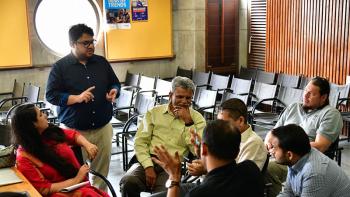Quick Facts
Individuals served in FY22: 8,340
- Through new construction – 300
- Through incremental building – 4,055
- Through market development – 685
Volunteers hosted in FY22: 201
Other facts:
- Population: 98.6 million
- Life expectancy: 73.6 years
- Unemployment rate: 2.32%
- Population living below poverty line: 2.23%
Source: World Factbook
Habitat for Humanity in Vietnam
Habitat for Humanity began working in Vietnam in January 2001 with its first project in Da Nang City in the central coastal region. As of January 2019, Habitat has enabled more than 14,800 low-income Vietnamese families to improve their living conditions through decent homes, clean water and safe sanitation. Habitat Vietnam has also provided training in areas such as disaster preparedness, financial education, and hygiene practices to nearly 123,000 individuals.
The housing needs in Vietnam
Thanks to rapid economic growth and political reforms, Vietnam has lifted more than 45 million people out of poverty since the early 1990s. Nonetheless, Vietnam is among the countries that are most vulnerable to climate change and disasters. There is a pressing need for resilient housing solutions as 30 million people including many poverty-stricken families will be living in disaster-prone areas by 2025, based on government estimates. A Red Cross report in 2022 highlighted the impact of disasters in 2020 ― more than 511,000 houses were submerged with another 3,429 houses collapsing while over 333,000 homes were damaged or had the roofs torn off.
Putting people at the center, Habitat for Humanity Vietnam also supported a total of 20,877 people through policy or system changes in fiscal year 2021.
How Habitat addresses the need in Vietnam
Habitat Vietnam partners with low-income families to build, repair or upgrade their homes with families contributing “sweat equity” or their own labor, and typically repaying the costs through microfinance loans. International volunteers provide a hand-up by building alongside the families. Habitat also enables families to build facilities for clean water and safe sanitation based on their needs. The partner organizations that Habitat works with include the local government and communities. The training that Habitat offers to its partners includes appropriate construction technology, financial management, awareness and practice of proper hygiene, community-based disaster risk management.
Advocacy
Habitat for Humanity Vietnam influence policies, systems, and norms through empowering communities and strengthening institutions. Our pro-poor housing programs integrate the needs of people with disability while we advocate for the elimination of asbestos in programs by the Government of Vietnam. We also support the housing needs of people living in informal settlements.
Inclusion
We build inclusive housing and communities by enabling vulnerable and disadvantaged communities to raise their voices and increase their dignity. We provide housing solutions, water and sanitation access, and waste management for marginalized people, ethnic minorities, people with disability such as those affected by Agent Orange herbicides, and vulnerable groups living in disaster-prone areas. Working together with people living in informal settlements, we build safe and secure homes and advocate for housing through a rights-based approach.
Resilience
We build resilience to disasters, emergencies, and climate change through community-driven disaster risk management. Through the Participatory Approach for Safe Shelter Awareness approach, we engage local authorities, disaster risk management boards, and communities in protecting lives and assets. We also share customized housing solutions to build back safer with local masons and communities.
Market system
We promote inclusive housing through engagement with market actors. With our support, microfinance institutions such as the Women’s Unions are able to provide housing finance services for low-income communities. We also build the capacity of smaller local actors such as community housing funds and social funds by leveraging their revolving funds.


